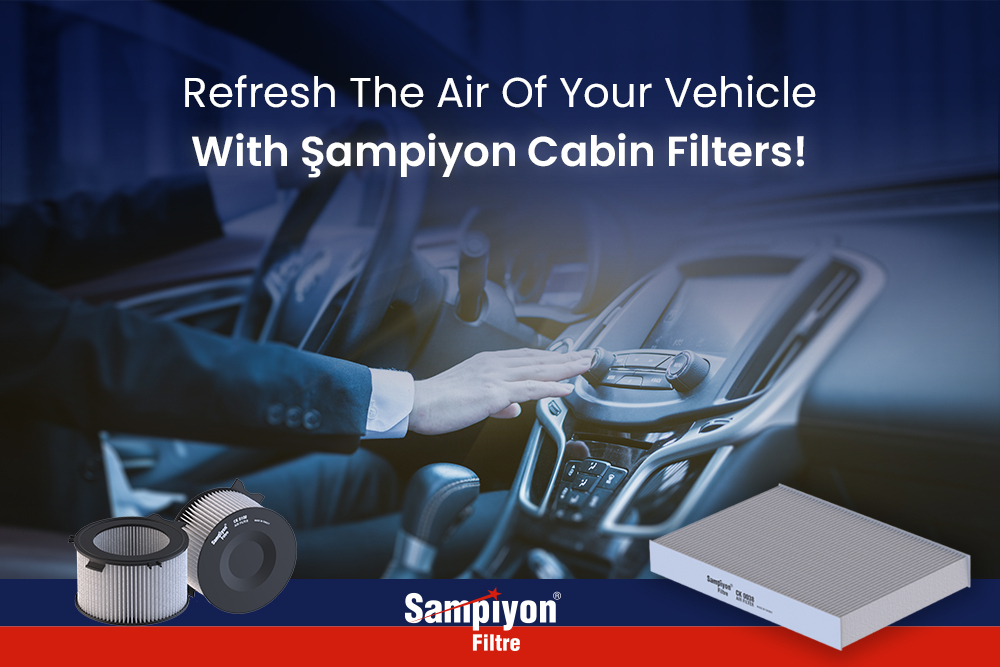
What is a Car Pollen (Cabin Air) Filter?
Refresh The Air Of Your Vehicle With Şampiyon Cabin Filters!June 27, 2022
It is a type of filter used in modern motor vehicles, which is responsible for providing clean air for the driver and passengers. Most automotive cabin air filters trap airborne particles entering the vehicle through the heating and air conditioning vents. Sophisticated ones can perform deodorization to make the air fresher and more comfortable to breathe. For many years, the only air filter cars had was the engine air filter. This changed around the year 2000 when automakers started to include the pollen filter in their cars. Since then, this filter has been an essential part of vehicles, almost every modern car has one.


A typical cabin air filter is a flat panel consisting of pleated filtration media and supporting frame. Some are made of cloth material, especially cotton. The shape of these filters varies depending on the type and model of the car. Cabin air filters capture pollen, mold spores, dust, soot, smoke, fumes and other small airborne pollutants. Filters also trap larger debris such as sand, insects, leaves and others when driving in harsh environments.
Pollen Filter Function
The purpose of cabin air filters is to keep the air inside your vehicle clean. Before these filters, car occupants had to deal with dust, smoke, exhaust gases, pollen and other pollutants that found their way into the cabin, which was very unpleasant. The absence of a cabin air filter can cause discomfort if you suffer from seasonal allergies. In addition, substances such as pollen and mold spores can cause respiratory complications. It creates a dangerous situation especially for children and the elderly.
The cabin filter eliminates all these problems by trapping the particles. This results in cleaner, allergen-free air that is healthier to breathe. If the filter also removes odors, the air will be free of bad odors and offer a more comfortable journey for the vehicle occupants. Cabin filters can also help air conditioning and heating systems run optimally. It traps particles and provides protection from damage caused by particles in the air.
How Does an Automatic Pollen Air Filter Work?

When the windows are closed, air enters the cabin through the vehicle's ventilation system. The ventilation system supplies air to the heater, vent, defroster and air conditioner. Before the air reaches the heating and AC (air conditioning) system, it has to pass through the cabin filter. The filter essentially consists of a material supported in a frame. This material can trap pollutants without affecting airflow. As air travels through this environment, particles such as dust, pollen, smoke, exhaust fumes or larger debris such as insects and leaves are trapped.
In this way, the air ventilating the cabin is kept clean and fresh for both the driver and passengers. Pollen filters are efficient devices that can trap particles down to the micron level. This means that it can even filter smoke or particles in smoke, protecting people in a vehicle from pollution. Some filters contain a layer of activated charcoal and remove odors from the air reaching the cabin.
Pollen Air Filter Location
It is important that you know where to find the cabin air filter in your car. Because from time to time you need to check its condition. And if it has stopped working, it's important that you know its location to replace it. The location of these filters varies from one vehicle to another. Usually, you'll find them behind the glove box or top box. Other locations include under the hood near the car's cabin and under the instrument panel, mostly on the passenger side. If you can't find it in these places, the manufacturer's manual will lead you to locate the cabin filter.
What is Pollen Air Filter Manufacturing Material?
Most pollen filters are made of a pleated paper material. Some are a mixture of cotton and paper, others are a cotton material coated with a cartridge. Paper air filters are often pleated to increase surface area. When the cabin filter is designed to eliminate certain odors, it will have a layer of activated carbon next to normal filter media. Porous carbon (usually coal containing various chemicals) removes harmful odors by adsorption (adhesion onto the surface). Many people confuse the cabin filter with the engine air filter, perhaps because these filters arrived late in automobile history.
Comparison of Engine Air Filter and Pollen Air Filter
These two types of automotive air filters are mostly the same in appearance. They work the same way. However, their purposes are very different. The engine air filter cleans the air before it goes to the engine and prevents particles and other pollutants from damaging the engine and engine components. Cabin filter, on the other hand, removes pollutants from the air before they reach the cabins and protects the driver and passengers and allows them to breathe clean air. Both filters mostly consist of a pleated media (filter media) placed in a frame and equipped with channels of an air intake system. A clogged engine air filter can affect vehicle performance. A clogged cabin filter does not affect vehicle performance. Instead, it affects the comfort of the occupants.
Cleaning or Washing the Pollen Air Filter

Some pollen (cabin air) filters can be cleaned and reused. These are filters that use a fabric material as the filtration medium . Paper and carbon cabin filters should never be washed. Instead, replace them. Water damages the paper and renders the filter unusable.
Does Pollen Air Filter Affect AC (Air Conditioning)?
If the filter is clogged, the AC (air conditioning) system has to work harder to push air through the filter. The resulting strain can reduce the life of the AC motor. It can even cause it to burn out. Does the cabin air filter affect mileage? A dirty cabin air filter does not affect gas mileage, as some people believe. However, it affects the efficiency of the AC system and causes the blower motor to require more power.
How Often is an Air Filter Replaced in a Car?

Regardless of whether it is the engine or cabin air filter, the frequency of replacement depends mainly on the driving conditions. Dirty environments with a lot of dust and other pollutants suggest more regular replacements. Most manufacturers and auto experts recommend intervals between 10,000 and 20,000 km. The determining factor is usually the weather conditions of the places where you drive your vehicle. Extremely polluted or dusty atmospheres will clog the filter faster. Cleaner environments allow you to use your cabin air filter for a long time.
Sampiyon Filter was founded in 1985 as a small family business that was founded in İskenderun. Our company, which has been named “Champion” since its first foundation, has been targeted as “Success in filtration”, and has been transformed into a larger family with more than 35 years of experience, and continues to produce high quality oil, fuel, air and hydraulic filters to automotive, agricultural, business machinery and commercial bus and truck groups in accordance with national and international standards.


